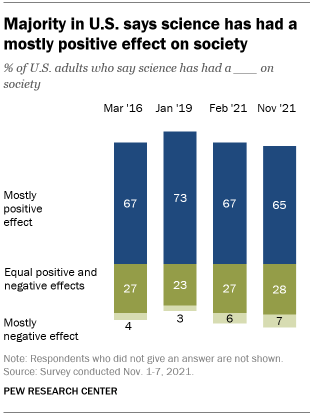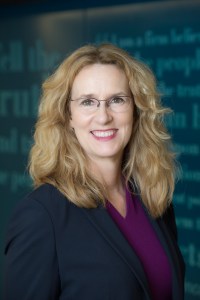About two-thirds of U.S. adults (65%) say science has had a mostly positive effect on society, while 28% say it has had an equal mix of positive and negative effects and just 7% say it has had a mostly negative effect, according to a recent Pew Research Center survey. Over the past few years, around two-thirds or more of Americans have seen science’s effect on society as mostly positive.
Of course, science encompasses a wide swath of disparate fields and developments. What exactly do Americans have in mind when they think about science?
A few common themes arise when U.S. adults are asked to talk about science’s effects on society in their own words or when they discuss areas of science they follow or find interesting. Most prominent among these are developments in health and medicine, such as new treatments for disease. Other, less commonly mentioned areas include references to computer and digital technology, the environment and advances in space exploration. Here’s a closer look at what Americans mean when they think about science, based on a new analysis of open-ended survey data and focus group discussions from the past several years.
Pew Research Center conducted this analysis to look at how Americans describe science in their own words. Analysis of survey data comes from a Center survey of 10,260 U.S. adults conducted from Nov. 1 to 7, 2021. Open-ended responses come from an earlier survey conducted in January 2019, with focus group discussions from a series of focus groups held in July 2021.
Everyone who took part in the survey is a member of the Center’s American Trends Panel (ATP), an online survey panel that is recruited through national, random sampling of residential addresses. This way, nearly all U.S. adults have a chance of selection. The survey is weighted to be representative of the U.S. adult population by gender, race, ethnicity, partisan affiliation, education and other categories. Read more about the ATP’s methodology.
Here are the questions used for this report, along with responses, and its methodology.
Focus group discussions were part of a broader Center research effort to better understand opinion about science and scientists among Black and Hispanic Americans. Six groups were held with Black adults (28 individuals in total) and six groups with Hispanic adults (29 individuals in all) between July 13 and July 22, 2021. All focus group discussions were held virtually for 90 minutes with three to six participants in each group. Groups with Hispanic adults were conducted in English or Spanish. Group discussions were conducted by professional moderators using a guide developed by Pew Research Center. Center researchers systematically coded interview transcripts for thematic responses using qualitative data analysis software. Here are the questions from the moderator guide and the focus group methodology.
Many mention health and medical advances when asked how science influences society
In a January 2019 survey, the Center asked Americans who said science has had a mostly positive effect on society to explain, in their own words, what they had in mind. The most common answer – given by 56% of those asked – referred to health and medical advancements, such as disease eradication, medical devices and new medications, and cancer research leading to longer lifespans and improved public health.
Medical science was also top of mind for some of those who said science has had a mostly negative effect on society. Some in this group lamented the wait for cures of serious diseases while others cited concerns about developments in biotechnology, such as cloning and “designer babies.”
These responses are generally in line with some of the themes that came up during a series of virtual focus groups the Center conducted in July 2021. The 12 focus groups consisted of 28 Black and 29 Hispanic adults and were part of a broader effort to better understand opinion about science and scientists among these racial and ethnic groups. The topics that were mentioned in these discussions offer another window into what the public sees as science.
Asked to elaborate on the areas of science they find interesting or exciting – or to discuss the science topic areas they follow in the news – several focus group participants referenced health and medicine. One Hispanic man in the 25-39 age group said he paid attention to “anything that has been developed in the medicine world or just for different treatments.”
Others mentioned progress in treatment for specific diseases such as cancer, sickle cell disease, diabetes or HIV, or the development of coronavirus vaccines. For example, one Black woman in the 40-65 age range said she was excited to hear about medical breakthroughs, such as “stuff with heart patients that they’ve done. Stuff with blood treatments and just going back to blood transfusions and cancer treatments, things of that sort.”
Another Black woman in the 40-65 age group said, “It’s more about the treatments that they are finding for diseases and for the vaccines and things they’re coming up with, especially for COVID and just the different types of treatments that are helping people, the different types of diseases. That’s what interests me most.”
It’s more about the treatments that they are finding for diseases and for the vaccines and things they’re coming up with, especially for COVID and just the different types of treatments that are helping people, the different types of diseases. That’s what interests me most.
A Black woman in the 40-65 age group, speaking in a focus group
Some connect science with advances in digital technology
In the Center’s 2019 survey, a smaller but still sizable segment of the public described the effects of science in terms of technology, computerization, workplace automation, GPS tools or social media platforms.
Participants in the Center’s 2021 focus group discussions also pointed to developments in technology, as well as the so-called “internet of things” – from GPS navigation to voice-activated assistants – as sources of interest and excitement for them. A Black man in the 40-65 age group said, “I find all the new products they are coming out with exciting. I can say, ‘Alexa, play music,’ and she’ll play my music.”
Others talked about developments in robotics and artificial intelligence as an area that catches their attention. A Black woman in the 25-39 age group said, “The improvements, we have drones flying in the air. Now you’re talking about drones delivering our packages.”
Some participants said they were interested in the ways digital technology connects people. One Hispanic woman in the 40-65 age range said, “I think technology has taken us to a third dimension, the fact that we can communicate with people in other parts of the world is something we never thought we could do.”
I think technology has taken us to a third dimension, the fact that we can communicate with people in other parts of the world is something we never thought we could do.
A Hispanic woman in the 40-65 age range, speaking in a focus group
Others think about the environment, space exploration and more
A number of other areas come to mind when people think about the effects of science on society. Some respondents to the 2019 survey gave a broad answer, such as the idea that science provides a better understanding of our world. Others mentioned a range of specifics, including improvements in food safety and crop yields, weather forecasting and air travel. Among the ideas that came up repeatedly were references to climate, energy and the environment, as well as the world of space exploration.
Focus group discussions in 2021 also touched on a range of topics, including some related to space. One Black woman in the 25-39 age group described what she found interesting as “the commercial travel of people into outer space, and then the research behind the different planets and finding out what’s beyond our galaxy.”
What science means to people in the UK
While this analysis is limited to the United States, there is some evidence that people in other countries may think of similar things when they think about science.
In the United Kingdom, government surveys have asked respondents to explain, in their own words, what comes to mind when they think of science. In the most recent of these, the 2019 UK Public Attitudes to Science survey, 24% of UK adults ages 16 and older associated science with fields of study such as biology, chemistry or physics. Another 16% referred to health, drugs, medicine and doctors.
As was the case in the U.S., some UK adults in the 2019 survey referred to technology (mentioned by 13%) or to space, rockets and astronomy (mentioned by 15%).





